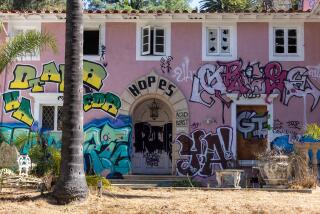Board Agrees Renting Wright House for Parties Is Wrong
- Share via
The Los Angeles Board of Zoning Appeals on Tuesday upheld a city ruling ordering a stop to private gatherings at a historic Frank Lloyd Wright house in the Los Feliz area.
The board voted 4 to 0 to deny an appeal of a zoning administrator’s determination that renting the grounds of the Ennis-Brown house for private events violates the city’s residential zoning code.
Los Feliz residents testified at the hearing that frequent events held at the house, at 2607-2655 Glendower Ave., bring noise and traffic to their neighborhood.
The monumental mansion on a hillside near Griffith Park is owned by a nonprofit corporation and is the largest and last of four experimental Mesoamerican block structures designed by Wright in Los Angeles. Built in 1924, it is listed on the National Register of Historic Houses.
The board’s decision is the latest round in a long-running feud between Augustus Brown, curator and former owner of the house, and the people who live near it. City officials have twice before ordered a stop to gatherings at the house.
At issue in the dispute is the practice of the Trust for the Preservation of Cultural Heritage--the group that owns the house--of making it available for a fee for parties held by individuals and organizations.
An attorney representing the trust testified at the hearing that eight such events were held at the house in 1988.
But residents say the number is closer to 30.
The trust contends that income derived from tours of the house and from private gatherings help pay for operating and maintaining the house. Officers of the trust said such events brought in about $100,000 last year. The events held last year included several weddings and a party held by Home Box Office.
“We want to live; we don’t want to be destroyed,” Brown said. “We don’t want the neighbors to say to us, ‘No, you cannot share this house with the public.’ ”
Residents who live on the narrow, winding streets leading to the massive, textile block house say events held there disrupt the neighborhood. At the hearing, several described catering trucks rumbling past their houses, limousines blocking their driveways, and beer cans and trash littering their lawns.
“They’re renting it out as a rental hall, that’s what’s going on, and they’re turning it into a dump,” said Herb Barish, who lives near the house. “I don’t think Frank Lloyd Wright built the house with the idea of annoying everyone else in the area.”
The house is also used frequently by movie production companies and is toured by thousands of people each year. People who live near the house have said they are not opposed to those uses.
The dispute between the neighbors and those involved in preserving the home began in 1985 when neighbors first complained about the noise and traffic they said were caused by events at the house. Since then, several attempts to resolve the issue have gone nowhere.
Brown said that in response to the neighbors’ complaints, he has instituted stringent rules for events at the house.
He said the rules limit the number of people who can attend events and prohibit amplified sound systems and private cars on the roads leading to the house.
But the more than 70 residents who have written letters to city officials complaining about the gatherings say that in a community where houses cling to hillsides along winding roads, gatherings cannot help but disrupt the quality of life.
Future Uncertain
The future of the house has been uncertain since May, when its board of directors said it might be necessary to strip the landmark of artwork designed by Wright if funds could not be obtained to make needed repairs.
The board estimated that the structure is in need of at least $1 million in repairs. These include reconstruction of retaining walls and the courtyard, which have partly collapsed, and a new roof.
The landmark has been maintained by the trust since 1980, when Brown, who bought the home for $119,000 in 1968, donated it. Brown lives in the house and serves as its unsalaried curator.
After the hearing, Brown said he will continue to rent the house for private parties until the city initiates legal action against him.
“We will continue as long as we can legally do so,” Brown said. “We have tried in every way to accommodate the neighbors. They don’t want that. They want us to disappear.”
More to Read
Sign up for Essential California
The most important California stories and recommendations in your inbox every morning.
You may occasionally receive promotional content from the Los Angeles Times.










